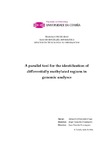A parallel tool for the identification of differentially methylated regions in genomic analyses

Use este enlace para citar
http://hdl.handle.net/2183/30276
A non ser que se indique outra cousa, a licenza do ítem descríbese como Atribución-NoComercial-SinDerivadas 3.0 España
Coleccións
Metadatos
Mostrar o rexistro completo do ítemTítulo
A parallel tool for the identification of differentially methylated regions in genomic analysesAutor(es)
Director(es)
González-Domínguez, JorgeTouriño, Juan
Data
2021Centro/Dpto/Entidade
Enxeñaría informática, Grao enDescrición
Traballo fin de grao. Enxeñaría Informática. Curso 2020/2021Resumo
[Abstract] Parallel and High Performance Computing (HPC) has gained attention in the last years as a
mean to accelerate several kind of computationally expensive applications. Bioinformatics is
one of the fields that benefits from this acceleration, since it demands a high computational
power to analyse the biological data obtained from experiments. Due to the cost reductions
related to obtaining biological data, more and more tools are able to extract conclusions out
of this data are coming out, with capabilities to visualize, analyse and extract, but they come
with high execution times and computational requirements.
In particular, methylation analysis is one of the bioinformatics fields that fits into this
description, since this process is associated to different biological functions, and abnormal
methylation levels can indicate the presence of certain diseases. For instance, the existence
of regions with different methylation levels is a common characteristic for several types of
cancer. Therefore, discovering differentially methylated regions is an important research field
in genomics, as it can help to anticipate the risk to suffer from some diseases. Nevertheless,
the high computational cost associated to the discovery of differentially methylated regions
prevents its application to large-scale datasets. Hence, a much faster application is required
to further progress in this research field.
During this bachelor’s thesis an optimized version of RADMeth, a tool for the identification
of differentially methylated regions based on beta-binomial regression, has been developed
and arranged to take advantage of the features of HPC systems. The different optimization
techniques implemented were developed by applying a workload distribution among the
processing elements using domain decomposition and by keeping in mind the typical architecture
of HPC systems composed of several nodes (each of the nodes being a multicore system)
so the novel tool takes advantage of both levels by a hybrid MPI/OpenMP implementation.
This way execution time was significantly reduced, Performance was tested on a cluster
composed of 16 nodes, with 64 GB of memory and 16 cores per node (256 nodes in total).
Obtained results were very satisfactory, obtaining speedups up to 194x. [Resumen] La computación paralela y de altas prestaciones (HPC por sus siglas en inglés) está ganando
atención en los últimos años como medio para acelerar varios tipos de aplicaciones con un
coste computacional elevado. Una de las disciplinas que se beneficia de esto es la bioinformática,
que requiere una gran potencia computacional para analizar los datos de experimentos
biológicos. Debido a la reducción de costes asociados a la obtención de datos biológicos, más
y más herramientas capaces de visualizar, analizar y extraer conclusiones de estos datos salen
a la luz, pero vienen con elevados tiempos de ejecución y requisitos computacionales.
Concretamente uno de los campos que cumple estas características es el análisis de la
metilación, ya que este proceso está asociado con diferentes funciones biológicas y niveles
raros de metilación pueden ser un indicativo de la presencia de enfermedades. Por ejemplo,
la existencia de regiones con diferentes niveles de metilación es una característica presente
en muchos tipos de cáncer. Por tanto, el descubrimiento de regiones con diferentes niveles de
metilación es un importante campo de investigación. Sin embargo, llevar a cabo este análisis
sobre grandes cantidades de datos es un proceso computacionalmente costoso, por lo que se
requiere de una herramienta mucho más rápida para prograsar en este campo de investigación.
En este trabajo se ha desarrollado una optimización de RADMeth, una herramienta que
identifica regiones diferencialmente metiladas basada en regresión beta-binomial, adaptándola
para aprovechar las ventajas de los sistemas HPC. Las paralelizaciones implementadas
fueron desarrolladas aplicando una distribución de la carga de trabajo entre los elementos de
procesado usando descomposición de dominio y teniendo en cuenta que los sistemas HPC
suelen ser sistemas multinodo con nodos multinucleo, por lo que la nueva herramienta aprovecha
las ventajas de ambos con una aproximación híbrida basada en MPI Y OpenMP.
De esta forma se consiguió reducir el tiempo de cómputo de forma significativa. Las pruebas
de rendimiento se realizaron en un cluster, con 16 nodos y 64 GB de memoria y 16 núcleos
por nodo (256 núcleos en total). Los resultados obtenidos fueron muy satisfactorios,
consiguiendo aceleraciones de hasta 194x.
Palabras chave
Differential methylation
Whole genome bisulfite sequencing
Beta-binomial regression
Bioinformatics
MPI
OpenMP
High performance computing
Parallel computing
Whole genome bisulfite sequencing
Beta-binomial regression
Bioinformatics
MPI
OpenMP
High performance computing
Parallel computing
Dereitos
Atribución-NoComercial-SinDerivadas 3.0 España






